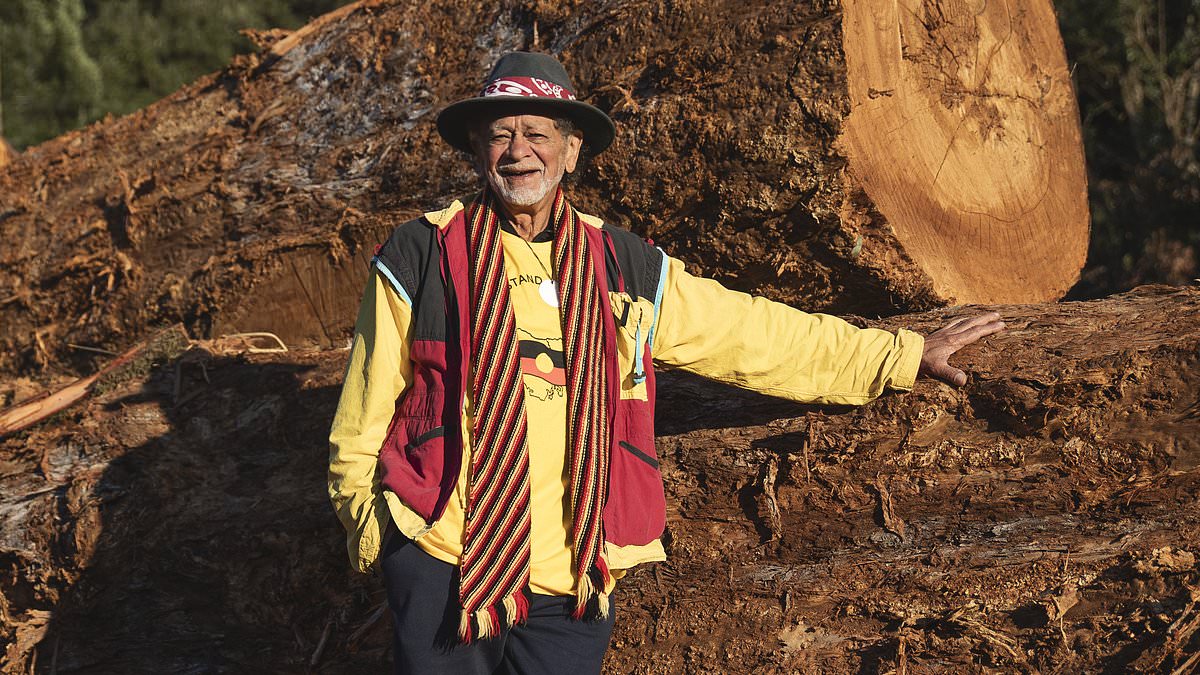A Hobart magistrate has issued an arrest warrant for an Aboriginal activist who refused to attend court on charges stemming from a protest because he does not consider himself an n citizen.
Jim Everett-puralia meenamatta, 81, said he had no intention of appearing in a ‘colonial court’ and claimed it ‘doesn’t have any jurisdiction over Aboriginal people protecting our country’.
‘We’ve never made any agreements to be citizens,’ Everett-puralia meenamatta said.
The activist was arrested and charged with trespassing in March over an anti-forestry protest in the Styx Valley of the Giants in southern Tasmania.
His matter was listed in the Hobart magistrates court on Monday but he chose to not appear, prompting magistrate Glenn Hay to issue an arrest warrant for the 81-year-old.
‘There was no need to show up, the court doesn’t have any jurisdiction over Aboriginal people protecting our country.’
Everett-puralia meenamatta, who plans to continue protest action in coming months, said he was not fazed by the prospect of jail time or a fine.
‘They’ll either catch up with me before I get much else done … or they don’t,’ Everett-puralia meenamatta said.
‘I’ll probably get fined and then complete what I’m doing and keep building up this issue.
‘There’s no use standing up and arguing with a colonial government and expecting they’re going to listen the first time you jump up and down about it. I’m going to keep pushing.’
Forestry Tasmania, the state’s public forestry company, was logging in the area at the time of Everett-puralia meenamatta’s arrest.
As part of his bail conditions he has been banned from entering Forestry Tasmania’s permanent timber production land, which constitutes over 800,000 hectares of public forest in the state.
Yet, Everett-puralia meenamatta said he would continue to protest native logging.
‘I have every sovereign right to go there and protect my country, and they have no jurisdiction to stop me,’ he said.
‘They’ll have to take me by the arms’ into court.’
He said he would refuse to make a plea in ‘a colonial court’ and instead tell the magistrate they were standing on his sovereignty.
‘They’ll do as they will. I could be fined for contempt of court, it could be a whole range of things, it doesn’t matter,’ he said.
‘We’ll keep getting arrested until this issue is raised right across the country, and the government is forced to address the matter of citizenship.’
Veteran environmentalist Bob Brown, whose organisation arranged the March protest, attended court and described the situation as a legal test case.
‘A court is overriding the sovereignty of Jim Everett, an Aboriginal man who has such enormous respect in the First Nations community,’ Mr Brown told reporters.
‘Every similar nation in the world has a treaty with its original people where people have invaded, and established courts. This country doesn’t.’
Tasmanian Aboriginal Centre campaign manager Nala Mansell has called for the trespass charge to be dropped.
‘The power that white people have over Aborigines, our lives, culture and cultural responsibilities has to have some flexibility,’ she said in a statement.
‘White people can govern and manage themselves but their laws shouldn’t apply to Aboriginal people.’
Everett-puralia meenamatta, a pakana plangermairreenner man who has written poetry, plays, political and academic papers and short stories, has visited many remote Aboriginal communities.
‘If you understand what being Aboriginal is, it is being part of country,’ he said. ‘If you hurt country, you are hurting our community.
‘Much research has been done on the generational trauma, because of the destruction of our country.
